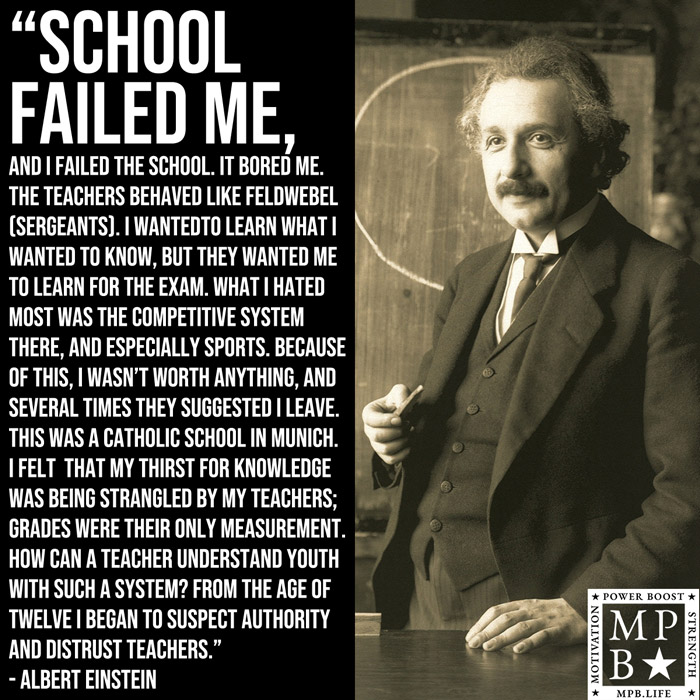
School Failed Me And I Failed The School Graphic © motivationpowerboost.com
“School failed me, and I failed the school. It
bored me. The teachers behaved like Feldwebel
(sergeants). I wanted to learn what I wanted to
know, but they wanted me to learn for the exam.
What I hated most was the competitive system
there, and especially sports. Because of this, I
wasn’t worth anything, and several times they
suggested I leave. This was a Catholic School in
Munich. I felt that my thirst for knowledge was
being strangled by my teachers; grades were their
only measurement. How can a teacher understand
youth with such a system? From the age of twelve
I began to suspect authority and distrust teachers.”
– Albert Einstein
The Thirst For Knowledge
Albert Einstein’s words resonate with a profound truth that transcends the boundaries of time and speaks to the very essence of our educational system. His experience, a tale of disillusionment and rebellion against the rigid confines of traditional schooling, serves as a clarion call for change.
Einstein’s thirst for knowledge, an unquenchable desire to explore the mysteries of the universe, was met with the suffocating embrace of a system that valued conformity over curiosity. The teachers, like military sergeants, demanded obedience and adherence to a predetermined curriculum, stifling the young Einstein’s spirit of inquiry. The competitive nature of the system, with its emphasis on grades and sports, left no room for the unique brilliance that would one day revolutionize our understanding of the cosmos.
Yet, in the face of this adversity, Einstein’s story is one of triumph. His refusal to be molded by a system that failed to recognize his potential is a testament to the power of the human spirit. He dared to question authority, to challenge the status quo, and to pursue knowledge on his own terms. This rebellious streak, born of a deep-seated frustration with the limitations imposed upon him, would become the driving force behind his groundbreaking theories and discoveries.
Einstein’s words serve as a reminder that true education is not about memorization or conformity, but about nurturing the innate curiosity and creativity that resides within each of us. It is about fostering an environment where individuals are free to explore their passions, to ask questions, and to challenge assumptions. It is about recognizing that each student is unique, with their own strengths and weaknesses, and that a one-size-fits-all approach to education is doomed to fail.
As we reflect on Einstein’s words, let us be inspired to create an educational system that values the individual, that encourages critical thinking and independent learning, and that recognizes the limitless potential of the human mind. Let us strive to create a world where the thirst for knowledge is not strangled, but celebrated and nurtured. For it is only by embracing the rebel within us, by daring to question and challenge, that we can truly unlock the secrets of the universe and build a brighter future for all.
Redefining Success in Education
Einstein’s words highlight the need to redefine the concept of success in our educational system. Too often, success is measured solely by standardized test scores, grades, and academic accolades. However, this narrow definition fails to capture the true essence of learning and personal growth. True success in education should be defined by the extent to which individuals develop a deep understanding of subject matter, cultivate critical thinking skills, and ignite a lifelong passion for knowledge.
A paradigm shift is required, one that moves away from the traditional emphasis on rote memorization and standardized testing. Instead, we should prioritize project-based learning, experiential activities, and open-ended investigations that encourage students to ask questions, explore their curiosities, and develop problem-solving abilities. By fostering an environment that values inquiry and intellectual exploration, we can nurture the next generation of innovators and visionaries, capable of tackling the complex challenges of our rapidly changing world.
Furthermore, it is essential to recognize that intelligence manifests itself in various forms, and a one-size-fits-all approach to education is inherently flawed. Some individuals excel in analytical and logical thinking, while others thrive in creative and artistic pursuits. By embracing a more comprehensive and inclusive definition of intelligence, we can create educational experiences that cater to diverse learning styles and aptitudes, ensuring that every student has the opportunity to discover and develop their unique talents and strengths.
In this quest to redefine success, we must also acknowledge the role of failure as a valuable learning experience. Too often, our educational system stigmatizes failure, creating an environment where students are afraid to take risks or venture outside their comfort zones. However, failure is an integral part of the learning process, and by cultivating a growth mindset that embraces mistakes as opportunities for growth, we can encourage students to embrace challenges, persevere through setbacks, and develop resilience – essential qualities for success in any endeavor.
Related Inspirational Quotes
“It is a miracle that curiosity survives formal education.” – Albert Einstein
“I spent three years at the university taking all the required courses, but I don’t remember a single thing that I learned there because I was so disinterested.” – Albert Camus
“Education is the kindling of a flame, not the filling of a vessel.” – Socrates
“What is the student but a mind bending under the weight of getting a morning lecture unopened?” – Virginia Woolf
“Education is not the learning of facts, but the training of the mind to think.” – Albert Einstein
